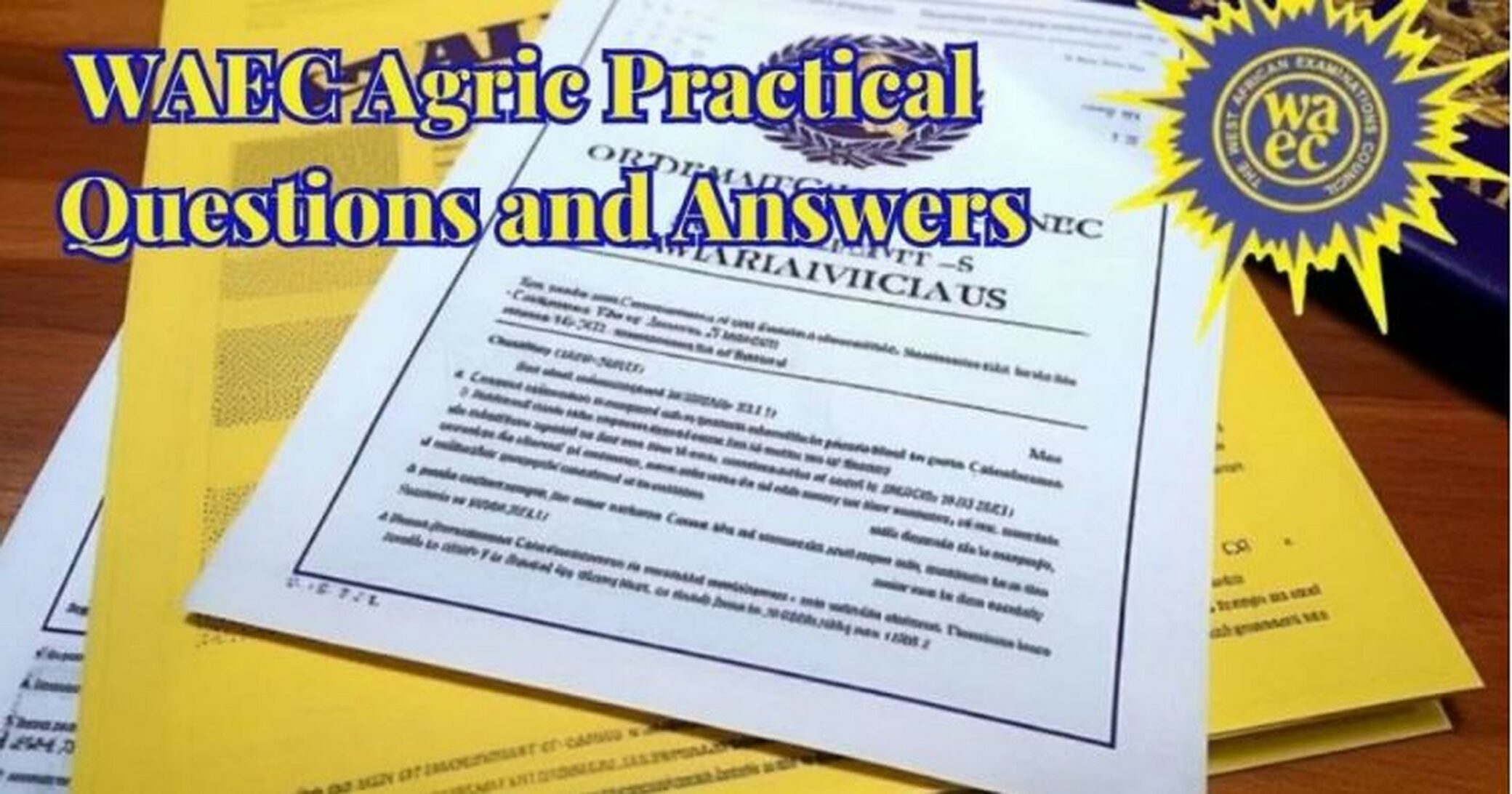Naija News Today
WAEC Agric Practical Questions and Answers 2023: Find WAEC Solutions Here

WAEC Agric Practical Questions and Answers 2023, find WAEC solutions below.
Newsone reports that the time for Waec Agricultural Science Practical 2023 is listed below for the first Agricultural Science Practical and the second Agricultural Science Practical.
WAEC Agricultural Science Practical Answers 2023
- Agricultural Science 3 (Practical) – 09:30 am – 11:00 am (1st Set)
- Agricultural Science 3 (Practical) – 11:30 am – 1:00 pm (2nd Set).
Attention all WAEC candidates! Are you prepared for your upcoming Agricultural Science Practical exam on May 26th, 2023? Below are WAEC Agricultural Science Practical Answers.
WAEC Agric Practical Questions and Answers 2023
The West African Examinations Council (WAEC) is responsible for conducting standardized tests in West Africa. Among these exams is the WAEC Agric Practical Examination, which is compulsory for students studying Agricultural Science. This examination aims to evaluate students’ practical skills in various aspects of agricultural production, processing, and marketing.
The WAEC Agric Practical Examination consists of two parts: a theory paper and a practical paper. The theory paper assesses students’ understanding of agricultural concepts and principles and is worth 100 marks. The practical paper, worth 200 marks, evaluates students’ ability to apply their knowledge in real-world agricultural scenarios.
Preparing for the WAEC Agric Practical Examination can be challenging but rewarding. Students who perform well in this exam will be equipped for future careers in agriculture. Some examples of the topics covered in the examination include:
- Identifying agricultural tools: Students may be required to recognize tools such as hoes, rakes, shovels, wheelbarrows, and watering cans.
- Demonstrating seed planting: Students might need to showcase the correct method of planting a seed in the ground.
- Demonstrating plant watering: Students may be asked to demonstrate proper watering techniques for plants.
- Identifying agricultural pests: Students could be expected to identify pests like grasshoppers, termites, and rats.
- Identifying agricultural diseases: Students might need to identify diseases such as leaf spot, powdery mildew, and rust.
These examples represent a few potential questions and answers for the 2023 WAEC Agric Practical Examination. Students preparing for this exam should carefully review their notes and textbooks. It is also advisable to practice the practical skills that will be assessed. By dedicating time and effort to preparation, students can enhance their chances of achieving success in the examination.
WAEC Agric Practical 2023
The WAEC Agric Practical Examination questions and answers for 2023 have been released. This examination is conducted by the West African Examinations Council (WAEC) as part of the Senior School Certificate Examination (SSCE) for Agricultural Science. The practical paper will take place on Friday, May 26, 2023.
The WAEC Agriculture practical exam will commence at 9:30 am. It is designed to align with the standards of previous years in terms of content, skill assessment, and adherence to the prescribed examination syllabus. Students can expect the examination to cover a comprehensive range of topics related to agricultural science.
Preparing thoroughly for the WAEC Agric Practical Examination is crucial for success. Students should make use of the provided questions and answers as a valuable resource in their preparation. By studying diligently and familiarizing themselves with the exam format, students can enhance their chances of achieving a good performance in the examination.
- Specimen A – Earthworm
- Specimen B – Termite
- Specimen C – Loamy Soil
- Specimen D – Sandy Soil
- Specimen E – Water Trough
- Specimen F – Feed Trough
- Specimen G – Egg Candler (Real/Picture/Diagram)
- Specimen H – Scoop Net
- Specimen I – Sugarcane
- Specimen J – Pineapple Fruit (whole)
- Specimen K – Ginger (whole)
- Specimen L – Honey (labeled)
- Specimen M – Sawdust
- Specimen N – Wood Shavings
- Specimen O – Electric Bulb
- Specimen P – Kerosene Lamp
- Specimen Q – Charcoal Pot.
Question 1.
(a) Identify specimens F, G, and H.
(b) In a tabular form, compare three physical characteristics of specimens F and G.
(c) (i) Which of the specimens F and G would you recommend for pond construction?
(ii) Give one reason for your answer in 1(c)(i).
(d) List two ways of improving specimen H for crop production.
(e) State two ways by which specimen I is of economic importance in agriculture.
ANS: (a) F (Clay soil), G (Loamy soil), and H (Sandy soil)
(b)
(c) Clay soil
Question 2.
(a) For each of specimens A, B, and D name two farm tools that can perform functions similar to those of the specimens.
(b) Describe how specimens B and D are used.
(c) Describe each of specimens A and C.
(d) Enumerate four advantages of using farm tools for farm work.
Question 3.
(a) Identify specimens E
(b) State two uses of specimens E
(c) Give two maintenance practices for specimens E
(d) Name two other farm tools that can perform the function of specimen E.
TRENDING
How Many Questions are to be Answered in WAEC Agric Practical?
The Agric Practical Examination administered by the West African Examinations Council (WAEC) comprises four inquiries, all of which necessitate a response within 1½ hours, accounting for a total of 60 marks.
These questions have been meticulously crafted to evaluate students’ comprehension and grasp of agricultural concepts and principles, as well as their aptitude in applying their knowledge to real-life agricultural scenarios.
The focal areas of examination encompass soil science, crop production, livestock production, agricultural economics, and agricultural extension. Students are expected to respond to the questions in a lucid and succinct manner, substantiating their answers with supporting evidence derived from their knowledge and personal experience.
While the WAEC Agric Practical Examination presents a formidable challenge, it bears immense significance. Excelling in this examination equips students with the necessary skills and preparation for a prosperous future in the field of agriculture.
To ensure success, it is imperative to thoroughly comprehend the given instructions. Take your time, approach the tasks diligently, maintain organizational efficiency, and seek assistance when needed. Remember, practice breeds perfection! The more you practice, the more adept you will become at tackling the question types encountered in the examination
WAEC
The West African Examinations Council (WAEC) is a reputable examination board responsible for coordinating and awarding certificates for examinations conducted in the English-speaking countries of West Africa. One of its primary assessments is the West African Senior School Certificate Examination (WASSCE), which serves as a standardized test for students across West Africa.
Established in 1952, WAEC has played a vital role in the education sector of West Africa. Its core functions encompass the coordination of examinations, issuance of certificates, and the establishment of an endowment fund aimed at supporting education through lectures and assisting those who lack financial resources.
WAEC examinations remain highly regarded and widely accepted in West Africa, serving as a benchmark for assessing the knowledge and skills of prospective students and employees by numerous universities and employers in the region. Comprehensive information about WAEC exams and certifications can be accessed through the council’s website or local education authorities.
WAEC holds great significance as an examination board for students in West Africa, with its exams enjoying broad recognition from universities and employers in the region. The council’s contributions to the education endowment fund and other initiatives further demonstrate its substantial impact on the region’s educational landscape




![BREAKING: Lagos WAEC Office On Fire, Many People Trapped [Video]](https://newsoneng.com/wp-content/uploads/2022/10/waec-office-fire-400x240.jpg)
![BREAKING: Lagos WAEC Office On Fire, Many People Trapped [Video]](https://newsoneng.com/wp-content/uploads/2022/10/waec-office-fire-80x80.jpg)






